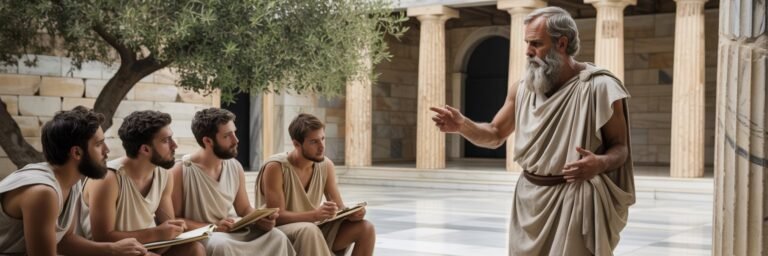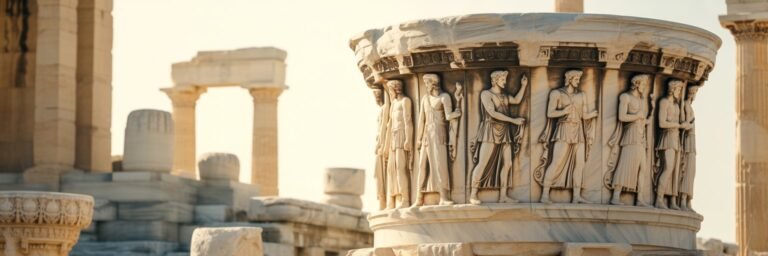INTRODUCTION
Classical Greece is an epoch that sparks massive interest and curiosity, exuding a timeless allure that leaves many enchanted. It represents a period where civilization advanced in extraordinary leaps and bounds, laying the groundwork for most of the modern world’s fundamental institutions, from governance and philosophy to the arts and sciences. Yet despite the plethora of historical accounts, the luminous world of Classical Greece continues to rouse intrigue, controversy, and passionate debates among historians, classicists, and history enthusiasts. This essay delves into this enchanting era, exploring its historical backdrop, examining theories and interpretations, probing into its mysteries and controversies, analyzing its symbolic significance in socio-cultural fabrics, and examining the modern fact-finding mission to uncover its truths.
HISTORICAL BACKGROUND
Classical Greece, roughly spanning the 5th to the 4th century BC, is pinned between the Persian and the Peloponnesian wars. It represents a cultural golden age with Athens being the epicenter of this historical period. Athens was a city-state known as ‘polis’, one among hundreds such independent entities scattered across the Mediterranean and Black Sea. It was during this era, led by forward-thinking statesmen like Pericles, that Athens’ democratic ideals were planted, fostering a unique societal setup in which citizens actively participated in the city-state’s critical decision-making.
Behind the scenes, however, the era witnessed profound intellectual advancements, with personalities like Socrates, Plato, and Aristotle shaping the course of Western thought and philosophy. These minds grappled with the pursuit of knowledge, asking fundamental questions about life, human nature, and the cosmic realms which still resonate within modern philosophical dialogues.
THEORIES AND INTERPRETATIONS
A widely held interpretation of classical Greek civilization is the idea of the ‘Greek Miracle’. This view espouses that the significant developments in various fields during this period arose spontaneously out of an intellectual void. The proponents of this view, however, are often criticized for ignoring the influences from preceding cultures such as Egypt and the Near East. Some modern historians argue that the Greeks borrowed heavily from these societies, assimilating and transforming ideas into original Greek thought. For instance, Pythagoras’ famous theorem is today recognized to have been known to the Babylonians a millennium before his time.
MYSTERIES AND CONTROVERSIES
The unparalleled progress of the classical Greek civilization was not without its enigmas and contention. The practice of pederasty serves as a glaring example. Seen largely as an educational institution, older men would enter a form of mentorship with adolescent boys. However, this tradition has initiated fervent debates among historians regarding its ethical connotations.
Furthermore, the abrupt and unexplained downfall of the highly advanced Minoan civilization on Crete before the rise of Classical Greece remains shrouded in mystery. Was it internal conflict, volcanic eruptions, or invasions that led to their downfall? Compelling arguments have been presented across the board, yet a definitive answer eludes us.
SYMBOLISM AND CULTURAL SIGNIFICANCE
Classical Greece’s cultural impact is far-reaching. The Greek Gods, epic poems by Homer, the tragedies of Sophocles, and the comedies of Aristophanes endure as cultural symbols representing the values and ideas of the time. Heroism, humanism, democracy and intellectualism — the Greeks celebrated these concepts, thus shaping up the cultural identity of the Western world. This symbolism remains deeply woven into our collective cultural psyche, encapsulated in literature, art, architecture, and philosophical ideology.
MODERN INVESTIGATIONS
Through technologies like ground-penetrating radar and underwater archaeology, modern investigations strive to unravel buried truths. An enhanced understanding of the influence of climate change on historical narratives, population migrations, and intercultural exchanges are now being examined in the light of new data. Research into the comprehensive integration of women into society, for instance, is throwing revolutionary light on the dynamism and diversity of the classical Greek era.
LEGACY AND CONCLUSION
The legacy of Classical Greece is as indelible as it is omnipresent. Democracy, the Olympics, the principles of mathematics, the axiomatic method, the Hippocratic oath, are all descended from this golden age. More than just a chapter in our collective past, it’s the cornerstone of the Western civilizational heritage.
But above all, perhaps Classical Greece’s most enduring legacy is its spirit of inquiry; it taught humanity to question, to reason, to seek truth beyond the realm of the obvious. This unyielding curiosity resonates in every thread of modern life, from our political structures to our scientific advancements.
Indeed, the history of Classical Greece is more than an historical tableau; it is an open dialogue between the past and the present, an unending conversation that encourages us to delve into the known, investigate the unknown, and perpetually strive for wisdom. And perhaps, in this journey, we come to understand not only whence we’ve come, but also whither we’re destined. For as the Greek philosopher Heraclitus once said, ‘Character is destiny’. And if Classical Greece shaped character, then it certainly helped shape our destiny.





